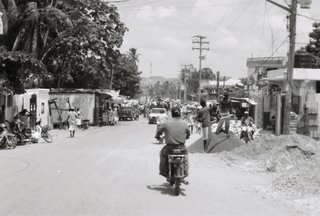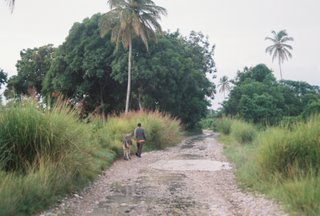
We all piled into the family car and headed out to see our cousins in southern Maryland. I guess I was little over 5-years-old. The side of my family we were visiting - the more Italian-Sicilian side - laughed and talked and ate with a gusto that enthralled my young sensibilities. My jolly older second-cousins smothered me into their ample chests and the more youthful third-cousins sucked me into their whirlwind of energy. After food, the kids decided to troop off into the wooded expanse in the back of the house. An adventure!
Hours must have passed before my mother found me - scooped me up and made a scene about where I'd gone, how long I'd been gone and about how EVERYONE was so scared for us! I looked at her with genuine confusion, and with my hands on my hips retorted, "Mommy, I wasn't lost -- I knew where I was!" Nearly two decades later, I find myself stepping out into an unknown world once again and releasing the grip of a hand that would protect me.
September, 2006: 4-am and the rain was pouring down in sheets - some nasty fringe weather from Hurricane Florence or Gordon. Despite the torrents of water, the airplane departed on time and made its way south to Miami. The connection time between flights was tight - 35 minutes to make the 10-am flight to Port-au-Prince. Walking into the waiting area at gate 17 was like walking into another world - a no-man's-land stuck between East Coast city life and Haiti.
The Haitian travelers around me sat in animated conversation with their neighbors or stared blankly at nothing. Pacing with apprehension, I made a few phone calls to ascertain the whereabouts of my fellow travelers who were to join me on this leg of the journey. As I heard the phrase "we're stuck in North Carolina" coming through the earpiece, my mother's parting words roared in my head, "if anything happens to the others - don't go to Haiti alone, whatever you do."
The portly gate attendant blinked at me when I asked to be moved to a later flight. My bag was on its way to Port-au-Prince and I either went with it at 10-am or not at all. Gulp. Ok.
The plane made it safely to the tarmac in Haiti's capitol city. Customs was a breeze. Theodore, the rickety old porter, guided me directly to Jean Gary, a very friendly and well fed taxi driver. Jean Gary took me to a "safe" place I could wait for the others - a gas station restaurant with an armed juvenile "standing guard." The place bustled with Haitians - light and dark, young and old - Dominican and Cuban workers, and UN peacekeeping troops. For over an hour I wrote in my journal and consumed Goya cookies and bottled water - resisting the temptation to call home and explain that I was, in fact, "alone" in Haiti.
My fellow visitors did not make it that day. The first leg of my journey continued without them - but to say I did it alone would be incorrect. With the help of many kind Haitians, I made it to the other airport, booked a flight to Les Cayes and arrived safely there that evening. By night-fall, I had joined Fr. Marc, some volunteers and Pwoje Espwa employees for a feast and a glass of good 5-star rum. I texted my dad that I had made it safely - within a few days I confessed I had made it "alone." Within a few more days, with my guts in a knot, I confessed my adamant intent to return as a volunteer and live at Vilaj Espwa.
Independence, though something all parents must cultivate and nurture in their children, must be a terrifying thing to watch grow. That understood - my job over the next couple months goes beyond fundraising and organizing to move to Haiti. It must be apparent that I take this next step in my life's journey with great consciousness - that my parents realize what I understand: I know where I am.




